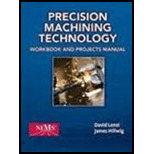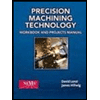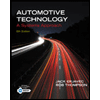
Precision Machining Technology (MindTap Course List)
2nd Edition
ISBN: 9781285444543
Author: Peter J. Hoffman, Eric S. Hopewell, Brian Janes
Publisher: Cengage Learning
expand_more
expand_more
format_list_bulleted
Concept explainers
Textbook Question
Chapter 5.1, Problem 1RQ
List the four main parts of the engine lathe.
Expert Solution & Answer
Trending nowThis is a popular solution!

Students have asked these similar questions
Auto Controls
Using MATLAB , find the magnitude and phase plot of the compensators
NO COPIED SOLUTIONS
4-81 The corner shown in Figure P4-81 is initially uniform at 300°C and then suddenly
exposed to a convection environment at 50°C with h 60 W/m². °C. Assume the
=
2
solid has the properties of fireclay brick. Examine nodes 1, 2, 3, 4, and 5 and deter-
mine the maximum time increment which may be used for a transient numerical
calculation.
Figure P4-81
1
2
3
4
1 cm
5
6
1 cm
2 cm
h, T
+
2 cm
Auto Controls
A union feedback control system has the following open loop transfer function
where k>0 is a variable proportional gain
i. for K = 1 , derive the exact magnitude and phase expressions of G(jw).
ii) for K = 1 , identify the gaincross-over frequency (Wgc) [where IG(jo))| 1] and phase cross-overfrequency [where <G(jw) = - 180]. You can use MATLAB command "margin" to obtain there quantities.
iii) Calculate gain margin (in dB) and phase margin (in degrees) ·State whether the closed-loop is stable for K = 1 and briefly justify your answer based on the margin . (Gain marginPhase margin)
iv. what happens to the gain margin and Phase margin when you increase the value of K?you
You can use for loop in MATLAB to check that.Helpful matlab commands : if, bode, margin, rlocus
NO COPIED SOLUTIONS
Chapter 5 Solutions
Precision Machining Technology (MindTap Course List)
Ch. 5.1 - List the four main parts of the engine lathe.Ch. 5.1 - What are the two main purposes of the lathe...Ch. 5.1 - What part of the lathe is used to set the feed...Ch. 5.1 - Prob. 4RQCh. 5.1 - Prob. 5RQCh. 5.1 - What is the purpose of the leads crew of a lathe?Ch. 5.1 - What two functions can the lathe tailstock...Ch. 5.1 - The standard taper in most lathe tailstocks is the...Ch. 5.1 - Define the swing and the bed length of a lathe.Ch. 5.2 - What is the special name for the type of jaw-type...
Ch. 5.2 - The most common variation of the above chuck has...Ch. 5.2 - Name two material shapes that can be properly held...Ch. 5.2 - List two advantages of using a self-centering...Ch. 5.2 - Name two material shapes that can be properly held...Ch. 5.2 - List three benefits of holding a workpiece between...Ch. 5.2 - List three potential advantages of using an...Ch. 5.2 - List three characteristics of a workpiece that...Ch. 5.2 - What type of mandrel would be ideal for gripping a...Ch. 5.2 - Name the type of tailstock center that raid be...Ch. 5.2 - What two auxiliary devices can be used to...Ch. 5.2 - Explain the differences between the two auxiliary...Ch. 5.2 - Name the device that is used to transmit the...Ch. 5.2 - Which two tool posts are the most efficient if...Ch. 5.2 - Which device may be used for either toolholding or...Ch. 5.3 - If a 0.050" depth of cut is taken on the diameter...Ch. 5.3 - A lathe cross slide uses a diameter-reading...Ch. 5.3 - In what units are feed rates measured for lathe...Ch. 5.3 - Are deeper cuts used for roughing or finishing...Ch. 5.3 - Calculate spindle RPM and machining time for...Ch. 5.3 - List three safety precautions related to clothing...Ch. 5.3 - What two materials are most commonly used for...Ch. 5.3 - What feature of a lathe cutting tool has a direct...Ch. 5.3 - Is a left-hand or right-hand tool normally used...Ch. 5.3 - What part of the lathe is used to feed the tool...Ch. 5.3 - When facing, why should the tool not be fed past...Ch. 5.3 - Should a left-hand or right-hand tool be used when...Ch. 5.3 - When and how should chips he removed from the work...Ch. 5.3 - What are two reasons for center drilling on the...Ch. 5.3 - When drilling and reaming on the lathe, how are...Ch. 5.3 - How can hole depth be controlled during drilling...Ch. 5.3 - What are two reasons boring may be selected to...Ch. 5.3 - Why must extra care be taken when performing...Ch. 5.3 - How can a tap be aligned when threading a hole on...Ch. 5.3 - Briefly define form cutting.Ch. 5.3 - How do grooving and cutoff speeds compare to...Ch. 5.3 - How can tool binding be overcome when cutting deep...Ch. 5.3 - List the two basic knurl patterns.Ch. 5.3 - How is knurling different from other lathe...Ch. 5.3 - List and briefly describe the two different types...Ch. 5.4 - The distance of actual contact of two mating...Ch. 5.4 - What feature of mating threads determines the...Ch. 5.4 - How many classes of fit are there in the Unified...Ch. 5.4 - Determine the major diameter limits for the...Ch. 5.4 - Determine the minor diameter limits for the...Ch. 5.4 - Determine the pitch diameter limits for the...Ch. 5.4 - Determine the approximate compound-rest in-feed...Ch. 5.4 - What is the name for the rotating device that...Ch. 5.4 - When threading, what is the reason for feeding the...Ch. 5.4 - Prob. 10RQCh. 5.4 - Why should the depth of cut be reduced for each...Ch. 5.4 - What dimension of the thread is measured by using...Ch. 5.4 - What measuring tool is used to visually inspect...Ch. 5.4 - List two applications of Acme threads.Ch. 5.4 - What type of thread is machined on a tapered...Ch. 5.5 - Briefly define a taper.Ch. 5.5 - What is the difference between an included angle...Ch. 5.5 - What does TPI stand for in relation to tapers?Ch. 5.5 - What are the TPI and TPF of a part with end...Ch. 5.5 - What are the corresponding centerline and included...Ch. 5.5 - What is the corresponding centerline angle of a...Ch. 5.5 - What is the limitation of the tool bit taper...Ch. 5.5 - What must be known to use the compound-rest taper...Ch. 5.5 - What taper turning methods allow use of the lathes...Ch. 5.5 - What two steps can be taken to eliminate backlash...Ch. 5.5 - The TPI specified on a print is 0.030". If...Ch. 5.5 - If TPF is 0.42", how much movement should register...Ch. 5.5 - What is the benefit of using the offset tailstock...Ch. 5.5 - What are two ways to reduce uneven pressure on...Ch. 5.5 - Calculate tailstock setover for a 13.5" part with...
Knowledge Booster
Learn more about
Need a deep-dive on the concept behind this application? Look no further. Learn more about this topic, mechanical-engineering and related others by exploring similar questions and additional content below.Similar questions
- Auto Controls Hand sketch the root Focus of the following transfer function How many asymptotes are there ?what are the angles of the asymptotes?Does the system remain stable for all values of K NO COPIED SOLUTIONSarrow_forward-400" 150" in Datum 80" 90" -280"arrow_forwardUsing hand drawing both of themarrow_forward
- A 10-kg box is pulled along P,Na rough surface by a force P, as shown in thefigure. The pulling force linearly increaseswith time, while the particle is motionless att = 0s untilit reaches a maximum force of100 Nattimet = 4s. If the ground has staticand kinetic friction coefficients of u, = 0.6 andHU, = 0.4 respectively, determine the velocityof the A 1 0 - kg box is pulled along P , N a rough surface by a force P , as shown in the figure. The pulling force linearly increases with time, while the particle is motionless at t = 0 s untilit reaches a maximum force of 1 0 0 Nattimet = 4 s . If the ground has static and kinetic friction coefficients of u , = 0 . 6 and HU , = 0 . 4 respectively, determine the velocity of the particle att = 4 s .arrow_forwardCalculate the speed of the driven member with the following conditions: Diameter of the motor pulley: 4 in Diameter of the driven pulley: 12 in Speed of the motor pulley: 1800 rpmarrow_forward4. In the figure, shaft A made of AISI 1010 hot-rolled steel, is welded to a fixed support and is subjected to loading by equal and opposite Forces F via shaft B. Stress concentration factors K₁ (1.7) and Kts (1.6) are induced by the 3mm fillet. Notch sensitivities are q₁=0.9 and qts=1. The length of shaft A from the fixed support to the connection at shaft B is 1m. The load F cycles from 0.5 to 2kN and a static load P is 100N. For shaft A, find the factor of safety (for infinite life) using the modified Goodman fatigue failure criterion. 3 mm fillet Shaft A 20 mm 25 mm Shaft B 25 mmarrow_forward
arrow_back_ios
SEE MORE QUESTIONS
arrow_forward_ios
Recommended textbooks for you
 Precision Machining Technology (MindTap Course Li...Mechanical EngineeringISBN:9781285444543Author:Peter J. Hoffman, Eric S. Hopewell, Brian JanesPublisher:Cengage Learning
Precision Machining Technology (MindTap Course Li...Mechanical EngineeringISBN:9781285444543Author:Peter J. Hoffman, Eric S. Hopewell, Brian JanesPublisher:Cengage Learning Automotive Technology: A Systems Approach (MindTa...Mechanical EngineeringISBN:9781133612315Author:Jack Erjavec, Rob ThompsonPublisher:Cengage Learning
Automotive Technology: A Systems Approach (MindTa...Mechanical EngineeringISBN:9781133612315Author:Jack Erjavec, Rob ThompsonPublisher:Cengage Learning Refrigeration and Air Conditioning Technology (Mi...Mechanical EngineeringISBN:9781305578296Author:John Tomczyk, Eugene Silberstein, Bill Whitman, Bill JohnsonPublisher:Cengage Learning
Refrigeration and Air Conditioning Technology (Mi...Mechanical EngineeringISBN:9781305578296Author:John Tomczyk, Eugene Silberstein, Bill Whitman, Bill JohnsonPublisher:Cengage Learning

Precision Machining Technology (MindTap Course Li...
Mechanical Engineering
ISBN:9781285444543
Author:Peter J. Hoffman, Eric S. Hopewell, Brian Janes
Publisher:Cengage Learning

Automotive Technology: A Systems Approach (MindTa...
Mechanical Engineering
ISBN:9781133612315
Author:Jack Erjavec, Rob Thompson
Publisher:Cengage Learning

Refrigeration and Air Conditioning Technology (Mi...
Mechanical Engineering
ISBN:9781305578296
Author:John Tomczyk, Eugene Silberstein, Bill Whitman, Bill Johnson
Publisher:Cengage Learning
The Most Common Metal Machining Processes (Metal Machining Video 1); Author: Sofeast Ltd;https://www.youtube.com/watch?v=uxVJ3qtezGw;License: Standard YouTube License, CC-BY
Machining process and Machine Tools; Author: Amar Gandhi;https://www.youtube.com/watch?v=X2mUJ8baaE0;License: Standard Youtube License